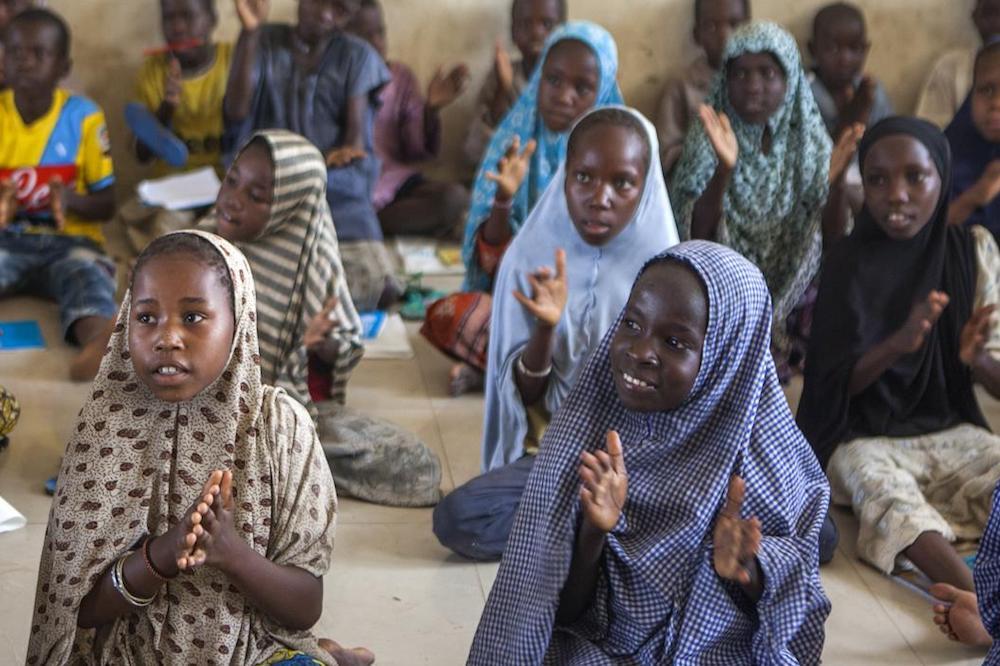
#UpForSchool campaign helps child rag pickers in Delhi slums
Campaigns, Child labour
Indian rag-picking children in the slum where they live and work
They are the rag pickers of Delhi. Children and their families who spend their days sifting through mounds of garbage, looking for items or recyclable material to sell.
The pitiful money they make feeds them for another day in the stinking slums of India’s massive northern city.
Sonam Kumari is one of the rag pickers. She is 14 and works for hours in the rubbish tips of a slum on the outskirts of Delhi instead of going to school.
A boy walks through the slum on the outskirts of Delhi
“I left school four months ago,” she said. “I would go to school and the other children would make fun of me because my parents are rag pickers. Because of this, I didn’t feel like studying.”
They are some of the most marginalised children in this vast country. But some of them do get an education – and the #UpForSchool campaign run by A World at School is having a real effect in their communities.
Many of the rag-picking children signed the #UpForSchool Petition, a youth-led demand for world leaders to ensure every child gets a good education. The petition collected 10 million signatures and was handed in at the United General Assembly last month. Some of the Delhi children signed their names. The illiterate ones used their thumbs to make prints on the petition – determined that their voices would be heard too.
Illiterate children sign #UpForSchool Petition with thumb prints
Balicharan, a community leader who organised the #UpForSchool Petition signing in the rag-picking community, said: “Because of a lack of education, these people are left behind and are forced to do this type of work. My focus is to educate them to help them come out of this bad situation.
“Education was not being highlighted here. But with the #UpForSchool campaign, the focus on education has been strengthened and the rag pickers’ voices will travel further. And more people will know about their situation.
“Through this, the community has became aware of the fact that in India every child has a right to education under law.”
A girl adds her thumb print to the petition
India has millions of rag pickers. The country generates 62 million tons of waste each year but less than a third of all waste and sewage is treated, according to Environment Minister Prakash Javadekar. In July, he announced a national award for the best rag pickers as a way of highlighting good waste management.
No one knows how many rag pickers there are in Delhi, home to many of the country’s most marginalised children.
Earlier this year, 10,000 children marched in the city to back the #UpForSchool campaign and to demand that the Indian government spend more money on education and health. #UpForSchool was promoted at the rally by the Centre for Social Equity and Inclusion (CSEI) and Nine is Mine – a child-led initiative to end poverty which calls for 9% of the country’s gross domestic product to be spent on education (6%) and health (3%).
Rag-picking children at a makeshift classroom in the slum
CSEI works to counteract the exclusion and discrimination against Dalits, Adivasis, Muslims and other communities – and especially the vulnerable children, youth and women within these groups.
CSEI director Annie Namala addressed the Delhi rally in February. She said Indian government data for 2014 shows six million children out of school but millions more are not being counted. She added: “It is important to say that we as a whole society stand #UpForSchool and we are concerned that every child should be in school.”
This week, she talked about the rag-picking children and their fight for education. Ms Namala said: “There are people and organisations working with the community.
Annie Namala from the CSEI organisation
“Balicharan is from the community and has been working with them. He and others like him have been educated and seen other parts of life, so they encourage the community and the parents to be aware that education is an important thing.
“CSEI is connected to them and we know how they value education. This is one group of children that has to be told there is a global movement that says every child should be in school and learning. That there is a national government that is saying that children should be educated and you have the right to an education.”
She said the factors pushing children into labour in India are not always economic. She added: “There is a tremendous desire to get educated and move forward. It is when the child drops out or is not learning or the parents think there is no point in getting this child into school, that is when the parent pushes the child into labour.”
MEET THE CHILD RAG PICKERS
Sonam Kumari. She does not go to school.
“I’m 14 years old. I left school four months ago. I was compelled to leave because of my situation. I would go to school and the other children would make fun of me because my parents are rag pickers.
“Because of this, I didn’t feel like studying. I didn’t think to go to another school.
“Three of my friends still go to school. My friends ask me to come to their school and it makes me feel bad to see them attend school.
“I don’t know what I’d prefer to be doing. I haven’t thought about it. I’ve forgotten.
“Morning to evening I work. I pick through waste. In the morning, I cook food for the family and then I pick through waste here in the slum.”
Guriah. She attends school, then works with her family separating waste.
“My age is 14. I don’t like this job. It’s a dirty job.
“Because when we go to school, everyone knows I come from a rag-picking family and they call me names and laugh at me.”
Nitish Kumar. He does not go to school.
“I’ve been doing this job for three years. I’m not sure how old I am – I think 11 or 12.
“I don’t work that much. I make one or two rounds in the neighbourhood to collect waste and then I come back. I work about one or two hours a day. I start at four o’clock in the morning. At 5:30am I’m done. Then I go and fetch water.
“This job as a rag picker I don’t like it so much but I’m OK with it. We get hurt sometimes by broken bottles and needles. I went to the doctor about four, five months ago. I got hurt and I couldn’t work for four, five days. I got an injection for tetanus.
“I collect waste from the streets nearby and put it into my bags. And from buildings and houses. I separate the waste and then sell it.
“I wake up at four o’clock in the morning, have tea and then go and pick up the waste. I fill up two big bags before I come back. I get plastic, mobile phones, all this I find in the garbage.
“I went to school in the past. I was in school in my home village for a year and a half. The teacher would beat me up badly to make me learn. I forgot my books at home and so the teacher would beat me. I would skip school sometimes and the teacher would catch us.
“There’s a couple of schools nearby. There’s one just here. I have no friends who go to school here. I don’t feel like going back to school. I’d rather earn money. I know I can earn more after if I go to school but I don’t feel like going back.”
THUMBS-UP FROM SHAKIRA
Colombian singing star and education campaigner Shakira handed the #UpForSchool Petition and its 10 million signatures to UN Special Envoy for Global Education in New York. When she added her own message, she was inspired by the thumb prints added to the petition by the illiterate rag-picking children in Delhi.
More news

